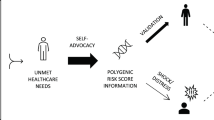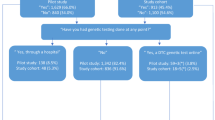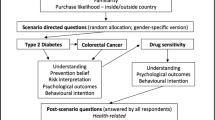Abstract
The general public continues to show increased interest and uptake of Direct-to-Consumer (DTC) genetic testing. We conducted an online survey (N = 405) to assess genetics knowledge, interest, and outcome expectancy of DTC genetic testing before and after exposure to a sample DTC disclaimer message. Descriptive statistics were used to analyze the relationship between previous genetic knowledge, attitudes and self-reported systematic processing of a sample DTC disclaimer message, outcome expectancies, and interest to pursue DTC genetic testing. Increased genetic knowledge and more positive attitudes towards DTC genetic testing were associated with increased self-reported systematic processing of the DTC disclaimer message. Further, self-reported systematic processing of the DTC disclaimer message was associated with greater interest in pursuing DTC genetic testing but did not predict outcome expectancies. As DTC genetic testing continues to gain in popularity and usage, additional research is imperative to better understand participants’ motivations and processing of the DTC disclaimer messages to improve the user experience.
This is a preview of subscription content, access via your institution
Access options
Subscribe to this journal
Receive 12 print issues and online access
$259.00 per year
only $21.58 per issue
Buy this article
- Purchase on Springer Link
- Instant access to full article PDF
Prices may be subject to local taxes which are calculated during checkout


Similar content being viewed by others
Data availability
The datasets generated and/or analyzed during the current study are available from the corresponding author on reasonable request.
References
Rosenberg J. As DTC genetic testing grows among consumers, insurers are beginning to get on board. Am J Manag Care. 2019 April 22, 2019.
23andME. Do You Speak BRCA? 2020. Available from: https://www.23andme.com/brca/.
Gollust SE, Hull SC, Wilfond BS. Limitations of direct-to-consumer advertising for clinical genetic testing. Jama. 2002;288:1762–7.
Koeller DR, Uhlmann WR, Carere DA, Green RC, Roberts JS, Group PGS. Utilization of genetic counseling after direct-to-consumer genetic testing: findings from the impact of personal genomics (PGen) study. J Genet Counsel. 2017;26:1270–9.
Moscarello T, Murray B, Reuter CM, Demo E. Direct-to-consumer raw genetic data and third-party interpretation services: more burden than bargain? Genet Med: Off J Am Coll Med Genet. 2019;21:539–41.
Tandy-Connor S, Guiltinan J, Krempely K, LaDuca H, Reineke P, Gutierrez S, et al. False-positive results released by direct-to-consumer genetic tests highlight the importance of clinical confirmation testing for appropriate patient care. Genet Med: Off J Am Coll Med Genet. 2018;20:1515–21.
Chaiken S, Liberman A, Eagly A. Heuristic and systematic processing within and beyond the persuasion context. Veleman J, Bargh J, editors. New York: Guildford; 1989.
Chaiken S. The heuristic model of persuasion. Zanna M, Olson J, Herman C, editors. Hillsdale, NJ 1987.
Hitt R, Perrault E, Smith S, Keating DM, Nazione S, Silk K, et al. Scientific message translation and the heuristic systematic model: insights for designing educational messages about progesterone and breast cancer risks. J Cancer Educ: Off J Am Assoc Cancer Educ. 2016;31:389–96.
Chaiken S, Maheswaran D. Heuristic processing can bias systematic processing: effects of source credibility, argument ambiguity, and task importance on attitude judgment. J Pers Soc Psychol. 1994;66:460–73.
Stewart KFJ, Kokole D, Wesselius A, Schols A, Zeegers MP, de Vries H, et al. Factors associated with acceptability, consideration and intention of uptake of direct-to-consumer genetic testing: a survey study. Public Health Genom. 2018;21:45–52.
Robitzsch A. Why Ordinal Variables Can (Almost) Always Be Treated as Continuous Variables: Clarifying Assumptions of Robust Continuous and Ordinal Factor Analysis Estimation Methods. Frontiers in Education. 2020;5.
Papacharissi Z, Mendelson A. An exploratory study of reality appeal: uses and gratifications of reality TV shows. J Broadcasting Electron Media. 2007;51:355–70.
Chen S, Chaiken S. The heuristic-systematic model in its broader context. Chaiken S, Trope Y, editors. New York: Guilford;1999.
Afifi WA, Morgan SE, Stephenson MT, Morse C, Harrison T, Reichert T, et al. Examining the decision to talk with family about organ donation: applying the theory of motivated information management. Commun Monogr. 2006;73:188–215.
Kahlor L. PRISM: a planned risk information seeking model. Health Commun. 2010;25:345–56.
Carere DA, Kraft P, Kaphingst KA, Roberts JS, Green RC. Consumers report lower confidence in their genetics knowledge following direct-to-consumer personal genomic testing. Genet Med: Off J Am Coll Med Genet. 2016;18:65–72.
Krosnick JA, Petty RE. Attitude strength: an overview. Attitude strength: antecedents and consequences. Ohio State University series on attitudes and persuasion, Vol. 4. Hillsdale, NJ, US: Lawrence Erlbaum Associates, Inc; 1995. p. 1–24.
Chaiken S, Maheswaran D. Heuristic processing can bias systematic processing: effects of source credibility, argument ambiguity and task importance on attitude judgment. J Per Soc Psycho. 1994;66:430–73.
Eagly A, Chaiken S. The psychology of attitudes. San Diego: Harcourt Brace Jovanovich. 1993.
Lachance CR, Erby LA, Ford BM, Allen VC Jr, Kaphingst KA. Informational content, literacy demands, and usability of websites offering health-related genetic tests directly to consumers. Genet Med: Off J Am Coll Med Genet. 2010;12:304–12.
Byron MJ, Hall MG, King JL, Ribisl KM, Brewer NT. Reducing nicotine without misleading the public: descriptions of cigarette nicotine level and accuracy of perceptions about nicotine content, addictiveness, and risk. Nicotine Tob Res. 2019;21:S101–S7.
Dougherty MJ, Lontok KS, Donigan K. The critical challenge of educating the public about genetics. Curr Genet Med Rep. 2014;2:48–55.
Funding
There was no specific funding associated with this manuscript.
Author information
Authors and Affiliations
Contributions
MR: conceptualization, methodology, writing-original draft, writing-review & editing. SH: conceptualization, methodology, writing-review & editing. AP: conceptualization, methodology, writing-review & editing. KS: conceptualization, methodology, writing-review & editing.
Corresponding author
Ethics declarations
Competing interests
The authors declare no competing interests.
Ethics approval
All procedures followed were in accordance with ethical standards of the responsible committee on human experimentation (institutional and national) and with the Helsinki Declaration of 1975, as revised in 2000. Informed consent was obtained from all participants included in the study.
Additional information
Publisher’s note Springer Nature remains neutral with regard to jurisdictional claims in published maps and institutional affiliations.
Supplementary information
Rights and permissions
Springer Nature or its licensor (e.g. a society or other partner) holds exclusive rights to this article under a publishing agreement with the author(s) or other rightsholder(s); author self-archiving of the accepted manuscript version of this article is solely governed by the terms of such publishing agreement and applicable law.
About this article
Cite this article
Ruehl, M., Hovick, S., Philp, A. et al. Assessing the general public’s view of direct-to-consumer (DTC) genetic testing and their interpretation of DTC website disclaimer messages. Eur J Hum Genet 31, 939–944 (2023). https://doi.org/10.1038/s41431-023-01411-y
Received:
Revised:
Accepted:
Published:
Issue Date:
DOI: https://doi.org/10.1038/s41431-023-01411-y
This article is cited by
-
A new impact factor for EJHG in 2022
European Journal of Human Genetics (2023)



